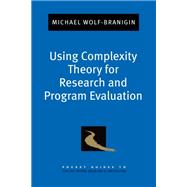Using Complexity Theory for Research and Program Evaluation
, by Wolf-Branigin, Michael- ISBN: 9780199829460 | 0199829462
- Cover: Paperback
- Copyright: 2/19/2013
Complexity as a paradigm has been underutilized by social work, but this cutting-edge pocket guide makes a convincing argument for its use. Every agency worker has been faced with a deluge of records, making it difficult to grasp onto structures and trends undergirding behavior. Complexitytheory studies the interactions of competitive and cooperative tendencies of agents such as individuals, families, groups, or communities, making the case that there is a hidden order in things that are seemingly chaotic. Exploring their interactions involves identifying a set of simple rules thatthe agents follow, revealing patterns that emerge without a predetermined template.Readers will learn how to frame their research using the components found in complex systems by using their existing knowledge of research methods and applying basic mathematical concepts. Concepts such as bordering between chaos and equilibrium, diverse perspectives, diverse heuristics, robustness,and wisdom of crowds are considered and applied to social work research studies. Basic introductions on game theory, graph theory, Boolean logic, decision theory, and network science provide the necessary mathematical background for understanding interconnectedness and networking.The next part of the book is a hands-on guide to the agent-based modeling software NetLogo. By inputting initial parameters and rules, the outputted models provide valuable information for visualizing unintended consequences, including how conflict can foster cooperation and how threats to a socialnetwork can improve the network's robustness and resiliency. The result is both a user-friendly introduction to using complexity theory in a socio-environmental context and a framework that provides an overarching structure for investigating process, outcomes, and the collective behavior ofgroups.






